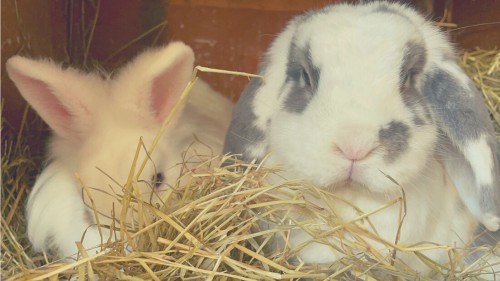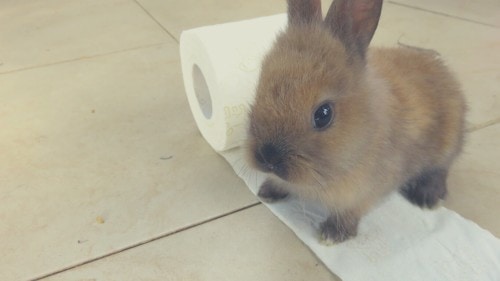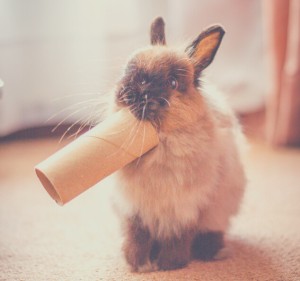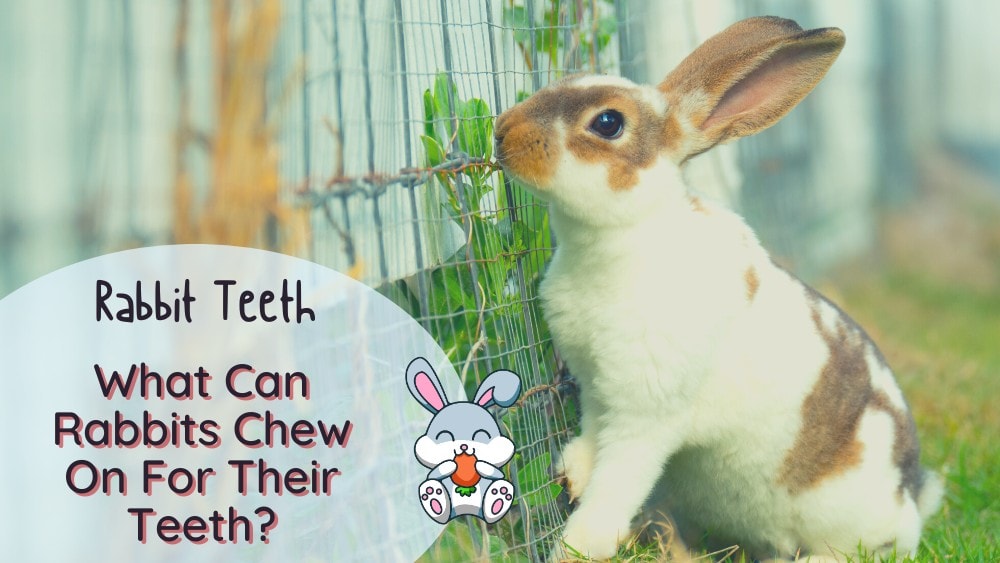Rabbits are smart, playful animals but their natural instinct to chew can get them into trouble! Not only can they destroy wooden household furniture and objects, but sometimes they can chew on things that can make them sick.
As a rabbit owner, you need to know which materials your rabbits can safely chew on to avoid catastrophes with your furry friend. So if you’ve ever wondered what you’re rabbits ought to be chewing, and what to avoid, you’re in the right place.
In this guide, I cover the information I share with my clients in the vet clinic to keep their pet rabbits chewing safely. We’ll cover:
- Why do rabbits need to chew?
- What things can rabbits safely chew?
- Things to avoid for their teeth and health.
What Can Rabbits Chew On For Their Teeth?
Rabbits can safely chew on things from their regular diet, like hay and alfalfa. They can also chew on hard natural materials, such as willow branches, dried apple sticks, and certain species of wood, but it’s important to ensure these are not treated with chemicals. Some owners also buy safe chew toys made of willow and lava.
Why Do Rabbits Like to Chew?
Rabbits need to chew to help grind their teeth down. Unlike us, rabbits have teeth that keep growing throughout their lives, a bit like our fingernails — their famous front teeth grow as much as 1 centimeter every month!
To keep these teeth from getting overgrown, bunnies have a healthy instinct to chew.
In the wild, chewing on grass all day long wears down this teeth and keeps them the right length, but pet bunnies typically spend less time eating each day. Giving your rabbits the right things to chew on will help satisfy their need to gnaw and help maintain the health of their teeth.
Materials That Rabbits Can Safely Chew On
Rabbits have a tendency to chew anything and everything, but some things are not safe for their digestive tract.
We reviewed 6 great items for your bunnies to gnaw on. Some of these could be homemade, or you can purchase them from pet stores.
Training your rabbit to avoid chewing things is difficult, so you should prioritize knowing the safety of the material your rabbit chews.
- Hay
Hay is a great nutritional item that your rabbits should have unlimited access to. It is their primary food and should always be available as part of their diet.
It is also good for rabbit teeth. Hay texture is fibrous, offering the necessary wear and tear for your rabbit’s teeth. It also provides physical and mental stimulation for your rabbits.

Give your furry pet a bit of chewing excitement and put their hay in hay racks, stuffed into boxes, or hung up in mini hay nets for them to forage.
- Alfalfa Cubes
Alfalfa cubes are formed by curing alfalfa plants in the sun. The blocks are highly compressed and an excellent source of fiber for small animals or pets. The cubes serve as your rabbits’ special treats and chew toys.

Make sure you buy alfalfa cubes that are safe for your rabbits – contain no preservatives, and are grown naturally without artificial pesticides. Rabbits who have urinary or bladder problems should not eat alfalfa because of the mineral content.
- Branches
Twigs are another safe rabbit-chewy material. You can get them from your garden or opt to buy them. Some of the tree branches that can provide your bunny with healthy chewing include;
- Dried apple wood sticks. These mini fruit tree branches are tiny pieces of dried twigs obtained from apple trees. They make popular rabbit chews.
- Branches from blackberry, and raspberry bushes.
- Willow. It is common for rabbits to have fun toys like twig balls or sticks. Be sure that the willow sticks or twigs are not treated chemically.
- Lilac. Since they are not toxic, you can offer your rabbits young and fresh lilac flowers and leaves.
Getting branches from outside is a cheaper option than buying them, but you need to take some precautions. Be careful because some trees might be hiding pests or sprayed with harmful pesticides. Therefore:
- Be certain of the type of tree branches and whether your rabbits can eat them when fresh or dried.
- Ensure the branches you pick are not from a polluted area.
- Wash the stems or leaves before giving them to the rabbits.
- Safe wood
Untreated or natural wood makes a fantastic chewy option as long as it is clean. Wash the wood you have collected before giving it to your pets. This will help to avoid toxic bacteria, mold spores, insects, or parasites.
Some safe wood types that satisfy your rabbit’s chewing habits include kiln-dried aspen, rose, fresh birch, poplar and maple.
- Grass mats
They are usually made from edible, healthy fibrous dry grass, making them safe for your bunny to munch on. Grass mats don’t usually have wires or threads sticking out and have not been treated chemically. This makes them brilliant for adding a comfy, safe space to the pets’ cages, so they can practice their natural nesting and chewing.

- Safe rabbit chew toys
Apart from hay, offer your rabbits other safe items or toys to keep them busy. These include:
- Willow Balls – Willow balls are amazing toys for your rabbits. They are mostly made with unpeeled willow to entice your pet to play and nibble them. You can buy willow balls especially made for rabbits to make sure they can last a long time.
- Chew Tubes – Chew tubes help you add fun colors and designs to your pet’s environment because the materials used are environment-friendly and safe for rabbits to gnaw. Their sizes differ, and you can get one depending on your preference. You can also save money and use toilet roll tubes.
- Stone Chew Toy – Stone chew toys are perfect for pet bunnies to grind their teeth. These toys are designed specifically to help prevent teeth from overgrowing. They are non-toxic and perfectly safe for bunnies.
- Hanging Toy Treats – Hanging toy treats provide an outlet for your rabbits’ chewing business but will also entertain them. These toys can be made from willow, loofah slices, or safe types of wood. You can hang them inside the enclosure to keep them from chewing other things in the house.

Just remember that these toys must not be used as a stand-in for hay. While they can help prevent teeth from overgrowing, the main thing your rabbit should be munching on is hay!
What You Should Not Let Your Pet Rabbits Chew On
We sometimes think that rabbits will instinctively make sensible choices about what to chew on, but unfortunately that isn’t always the case. Here are things your rabbit might chew on that are not good for their health.
Objects that can easily break
Unsafe materials such as plastic, fabrics, carpets, and things that break easily may lead to gastrointestinal (GI) blockage or GI stasis. This can also include soft rubber toys, which don’t provide much friction for grinding down the rabbit’s teeth, but can break into small pieces and be swallowed.
Even if eaten in small amounts, these breakable materials can still be deadly, leading to GI tract obstruction, and your bunny might need surgery.
Objects coated with chemicals
Treated woods, objects, and rabbit toys coated with harmful paints or adhesives are dangerous to the health of your bunnies. Unfortunately, this includes wooden furniture that has been painted or varnished — a pet rabbit favorite!
You should also avoid toys or objects not meant for bunnies, as you might not know what chemicals have been smeared on them. Being careful will save you an emergency visit to the veterinary specialist
Toxic or unsafe woods
Although it’s good for bunnies to chew safe sticks, some types of wood are toxic. For example, cedar and fresh pine cones are not good for the health of your rabbit pets because they have a lot of aromatic oil. Aromatic oil contains phenol that could lead to liver complications once inhaled by the pets. You should also not use them as rabbits litter.
Also, trees that produce fruit with pits, like cherry, plum trees, apricot, avocado, and peaches, are not safe for the rabbits to chew. Such stone fruit trees contain cyanide which is harmful when eaten by rabbits.
Electric wires and cables
Whether attracted by the noise from the live wires or to feel the vibrations, rabbits will often try to nibble on electric cables. This is dangerous for the rabbits and the household, as the rabbits might be electrocuted and the broken cables can cause electrical fires.
As the owner, invest in cord covers to prevent such incidents and protect your rabbit pets and home. Cover your cables in plastic tubing or move the electric cables away from your bunnies. Thoroughly bunny-proof areas your furry friends can access when they are not in their cage.
How to Control Chewing Habits of Your Pet Rabbit
Easier said than done, right? Your bunny’s love for gnawing isn’t a problem you can stop, but there are steps you can take to redirect your rabbits instinct to safe chewing materials.
- Provide more hay grass to your pets. You can try different varieties from different sources to add variety. For example, meadow hay and Timothy hay have different flavors for your rabbit.
- Keep your bunnies’ environment enriched with safe toys and things to play with. For example, you can provide a cardboard box or paper they can shred while having fun.
- Excessive chewing could be related to hormones. If your bunnies are old enough, you could consider neutering and spaying to improve their character.
- You can train your bunny with commands like ‘stop’ when they chew on things they aren’t supposed to. Also, give positive reinforcement when they behave.
- More play and spending time outside. Have fun with your bunnies, and allow them time outside their cage. Be patient with them, despite how frustrating it might be. Visit your vet regularly to rule out any health concerns of your pet rabbits.
Frequently Asked Questions
Can rabbits chew bamboo?
Yes. Rabbits can chew on bamboo. Bamboo is coarse and lightweight, making it the best chewable material for rabbits. However, it is good to note that only dried bamboo is recommended for your pets, and you should source it from reputable pet brands.
Can rabbits chew paper?
Rabbits can definitely chew on paper, and this can be a great source of enrichment for them. Although paper isn’t coarse enough to offer resistance for your bunnies’ teeth, they might be fun for them. However, documents with ink are not good for your rabbits’ health; therefore, you should avoid giving them written books, printed papers, or magazines. Some safe pieces are:
- Newspaper. Most of them are printed using soy-based ink, which is not harmful to rabbits. You can shred them and make chew toys for your pets.
- Packing paper. This paper is either brown or white and is not printed. Great for rabbits to chew on.
- Toilet paper rolls. They are usually not inked or printed, so they can be fun toys for your rabbit to play with and chew.

Can rabbits chew cardboard boxes?
Yes, they can. Rabbits love munching on cardboard boxes. Boxes are readily available and inexpensive. Just go to your local supermarket and get a few, choosing ones that don’t have ink on them.
Before you give the boxes to your bunnies, clean them of tape and labels. You can stuff the boxes with loose hay, providing healthy roughage and keeping your rabbit occupied for hours. You also don’t need to worry if your rabbit eats the cardboard box, as it’s easily digested.

As much as your rabbits love playing and nibbling the cardboard, limiting the quantity you give them is fine. Because they add no nutritional value, you wouldn’t wish your adorable pets to fill their bellies with boxes rather than food.
Conclusion
Rabbits’ natural behavior involves chewing or nibbling on things to keep their teeth busy — and it’s a good thing if it means they don’t need their teeth trimmed so often! But as responding rabbit owners, it’s important to know what to let your rabbit chew. Rabbits can safely chew stuff made with raw foods, non-toxic woods like natural apple sticks, and toys specially made for rabbits.
If you are unsure whether a type of wood is safe for your rabbits to eat, seek advice from an experienced rabbit vet. But you can avoid this by buying your rabbits’ treats, foods, or chew toys from pet stores.
If this article has helped you, please share it with your fellow rabbit owners! If you have any questions concerning chewy materials for your pet rabbit, please comment in the comment section.


